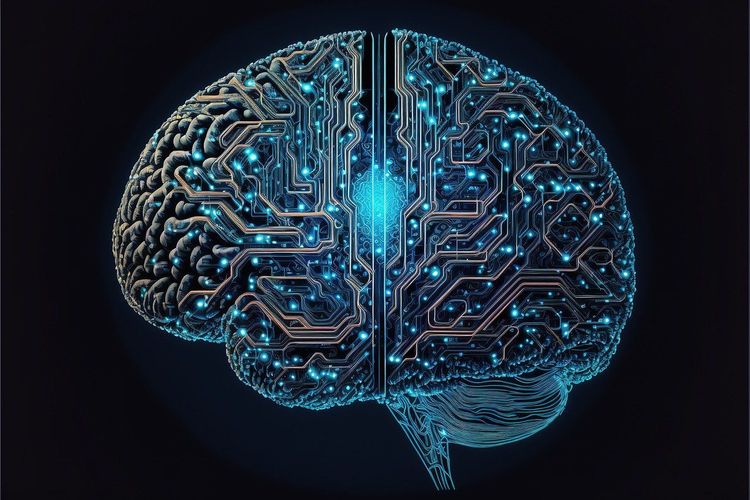In the realm of science fiction, the idea of humanity connecting our minds into a global "hive mind" originated in Olaf Stapledon's 1930 novel "Last and First Men." This work describes a future where humans biologically evolve to link telepathically, forming highly intelligent collective minds.
In reality, this concept is known as Collective Superintelligence, which utilizes advancing generative AI technologies rather than telepathy. These technologies enable large human groups to engage in real-time deliberative systems, empowering us to solve complex problems by leveraging our collective knowledge and insights.
As an AI researcher for over a decade, I firmly believe this approach can create superintelligent systems that prioritize human values, morals, and interests in every assessment and decision made. While some may find the idea of large groups collaborating in real time unsettling, nature offers a precedent.
Many social species have naturally evolved to make rapid decisions as large groups, surpassing the cognitive abilities of individual members. This phenomenon, known as Swarm Intelligence, allows schools of fish, swarms of bees, and flocks of birds to swiftly address critical challenges using collective cognitive prowess far beyond their individual capacities.
One particularly inspiring embodiment of Swarm Intelligence is the fish school. At first glance, it appears simple, yet behind it lies a system where thousands can make intricate decisions without a designated leader. Notably, fish schools can arrive at effective solutions even when no single member possesses all the relevant information.
Consider a fish school confronted with three predators approaching from different directions. Although most fish lack awareness of the threats, small groups are aware of each predator's location. How can this large, informed grouping make a unified, rapid decision about evading danger?
Fish utilize a unique organ called the lateral line, which enables them to sense pressure and vibrations in the water, helping them gauge the speed and direction of nearby fish. By perceiving their neighbors’ movements, fish engage in a form of local deliberation, determining the best course of action based on the intent of their immediate companions.
Yet, this doesn't explain how overall decisions are made in the school. For instance, the group aware of a predator on the right may advocate for a leftward movement, while groups on the left might suggest going right. Meanwhile, those in the middle—unaware of the threats—may keep moving as they were. How, then, is consensus achieved rapidly?
The key lies in the overlapping conversations among groups. Each fish engages in discussions with different sets of neighbors, enabling swift information exchange that propagates through the school. This collaborative dynamic results in quick, collective decisions even in the face of limited individual information.
This raises an intriguing question: Can humans, too, deliberate as efficiently as fish schools, enabling quick decision-making in large groups facing complex issues?
Historically, the notion seemed impossible, as research indicates that effective human conversations typically flourish in small groups of four to seven individuals. As groups expand, the airtime and response time for each participant diminish, leading to disjointed monologues rather than cohesive dialogues. By the time group size reaches 20, genuine conversation often falters.
Advancements in generative AI have initiated a breakthrough: Conversational Swarm Intelligence (CSI). This technology enables large groups—whether 200, 2,000, or even 2 million—to discuss complex problems in real time and converge on optimal solutions with enhanced collective intelligence.
The initial step involves partitioning the larger population into manageable subgroups conducive to meaningful dialogue. For instance, a group of 1,000 could be divided into 200 smaller groups of five, each participating in its own chat or video session. While this does not create a unified dialogue, it facilitates numerous parallel conversations.
To replicate the overlapping group dynamics of fish schools, CSI employs LLM-powered "conversational surrogates." These AI agents distill insights from human participants within their subgroup and relay that wisdom to other surrogates in different groups. Each surrogate then conveys these insights in natural language, facilitating information flow across the entire population.
Recent studies affirm this method’s effectiveness. A 2023 study at Carnegie Mellon University compared real-time deliberations among 50 people in conventional chatrooms to those using Conversational Swarm Intelligence. Findings revealed that the latter led to more coherent discussions and a 50% increase in individual contributions.
To further investigate, a 2024 follow-up study assessed networked human groups taking IQ tests as a "hive mind." Groups of 35 participants, averaging an IQ of 100, achieved an effective score of 128—placing them in the 97th percentile—when utilizing the online CSI platform named Thinkscape. While this study examined smaller groups, other research has successfully tested groups as large as 250.
Though the studies primarily focused on text-based interactions, the CSI principles are applicable to teleconferencing, videoconferencing, and VR meetings. This adaptability enables large groups—from hundreds to thousands—to engage in coherent, real-time conversations that effectively solve problems, prioritize options, generate ideas, and make informed decisions with enhanced intelligence.
Ultimately, this approach has the potential to revolutionize various fields, including corporate collaboration, market research, civic engagement, and deliberative democracy. In the long run, it could pave the way for the development of superintelligent systems aligned with human values and sensibilities. By harnessing CSI technology, we might empower millions worldwide to collaborate as a global cognitive network, addressing our most challenging issues. This, I believe, offers a safer alternative than depending solely on artificial superintelligence, which may not prioritize human interests over time. Therefore, embracing Conversational Swarm Intelligence and generative AI tools—while keeping humans central to the process—could significantly reshape our future.
Louis Rosenberg is an established researcher focused on AI, collective intelligence, and mixed reality. He is the CEO and chief scientist of Unanimous AI.







